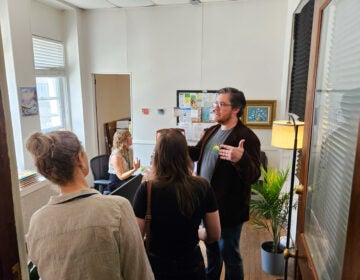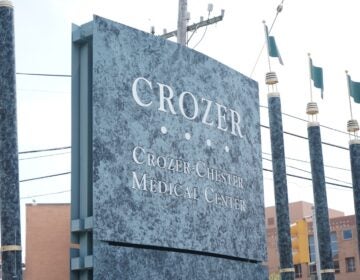‘Positive scientists’ say you can learn to be happier
Listen 6:11
Research show keeping a journal about things we’re grateful for makes us happier, and that’s good for our health. Reporter Shuka Kalantari shares journaling about skipping rocks on the beach with her toddler makes happy. (Shuka Kalantari/for WHYY)
A busy journalist and mom test drives tools from “happiness science.”
When the architects of America wrote about the pursuit of happiness in the Declaration of Independence, they were designing to protect citizens’ life, liberty, and prosperity. Later Congress defined happiness as “internal peace, virtue and good order.”
Despite relative prosperity and peace, depression and anxiety are common among Americans. Lots of people are chasing happiness these days, and brain researchers have lots of suggestions on ways to achieve it.
A gigantic research field has sprung up, investigating what could make us happier.
The takeaway? We can learn to be happy. It’s a skill we develop with time, like mastering yoga, or chess. So I decided to try one of these happiness suggestions to see what all the hype was about: I started a gratitude journal.
I’m a pretty happy person. I am also the mother of an active toddler, and I work. I get stressed out. I have my unhappy moments.
So for a week I wrote a daily list of things I’m thankful for — like the sound of my kid throwing pebbles into the marina by our house. I’m also grateful for his love of music, for my husband’s smile, and for all the other stuff that Hallmark cards are made of.
It’s probably no surprise, I found in my journaling that the people I love make me happier.
Decades of research echo this: Strong social relationships are a key to happiness, and that’s good for our health.
Dacher Keltner teaches psychology at the University of California, Berkeley, and he’s a leading researcher in this field. He says these happy feelings are good for our bodies.
“Feeling good about life and feeling like you have purpose and meaning and happiness, adds years to your life expectancy,” Keltner said. “They affect your nervous system, affect levels of cortisol. They lower your stress hormones. They influence the vagus nerve, which is a big bundle of nerves in your body that calms your body down and helps you connect to others.”
Keltner is a “positive psychologist,” he studies emotions like happiness and awe and empathy, and how they affect our health. The findings of his studies and other research is implemented in schools around the country. Preschools have meditation circles alongside their reading circles. High school students go on mindful nature hikes to combat depression. Keltner says we’ll be seeing these practices in the health care field next.
“A lot of the data show that doctors and nurses are really burned out and they are fried. That patients are enormously stressed,” he said. “And they’re starting to think about … Like how do you beautify hospital settings to take advantage of the benefits of nature? Can you have a little room for people to meditate or do yoga?”
And Silicon Valley tech companies are now hiring happiness consultants. HR managers are often called “chief happiness officers.” UC Berkeley neuroscientist Emiliana Simon-Thomas says keeping employees happy is good for a company’s bottom line.
“I think people are realizing that old models of highly competitive power hierarchies are not as effective,” she said. “They don’t lead to as much productivity. There’s a lot of cost related to turnover and stress-related illnesses.”
But John Grohol has a little shade to throw on this ray of happiness. He’s a psychologist and the founder of the mental health website PsychCentral.org.
“The core happiness levels, the core optimism levels that we experience in life, those are genetically predetermined. You can’t change those,” Grohol said.
New research suggests that about half of your “baseline happiness” — perhaps what you could call your general outlook on life — is inherited. Plus, he says, a lot of the original studies were done in labs, with college students required to participate in experiments for class credit.
The results on happiness that we’ve generalized to a whole nation of people were often never duplicated on more diverse groups of study participants.
“This a problem for a number of reasons. A university college student in America really does not represent the humanness of all people everywhere. And certainly not all age groups. When people enter college, they tend to be in their teenage years and they’re still very much a person under development,” he said.
Another issue happiness scientists have grappled with is what “happiness” really means. Today most psychologists agree happiness is not defined as perpetual pleasure. Positive psychologist Dacher Keltner says even children’s movies don’t try to perpetuate that story.
Keltner was a scientific consultant on the movie “Inside Out.” One of his Berkeley undergraduate students, a homeless veteran, told him: “That was one of the darkest movies I’ve ever seen.'”
The movie is about emotions — with names like Joy and Sadness and Anger — all personified inside the mind of an 11-year-old girl named Riley. In one scene, a character consoles Riley’s imaginary friend because Riley is growing out of her need to play with him.
“It was really about, life gets really sad. And that’s OK. In fact, sadness is beautiful and sadness has wisdom and sadness moves you forward to personal growth. And that’s the meaning dimension of it. Taking in the tough stuff,” Keltner said.
When I journaled about things I’m grateful for, it wasn’t all happy things. I also wrote about getting to spend 20 minutes with a friend a few weeks before an illness took his life. It’s a happy memory intertwined with a very sad one.
There are still lots of skeptics and questions about happiness science, but for me of it seems intuitively right — I connect with the idea that building good relationships and reflecting on what we’re grateful for makes us happier.
I’m not sure it will add years to my life, but writing about skipping pebbles on the beach with my toddler, definitely makes me feel happy. That’s something.
Editor’s note: An earlier version of this story misidentified the actor who voiced the character Sadness in the movie “Inside Out.” Phyllis Smith was the voice of Sadness.
WHYY is your source for fact-based, in-depth journalism and information. As a nonprofit organization, we rely on financial support from readers like you. Please give today.






